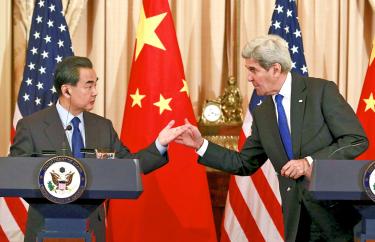As China deploys fighter jets, missiles and radars across the South China Sea, the US is to continue supporting Taiwan’s security, a top US admiral told the US Senate Armed Services Committee on Tuesday.
“I believe China seeks hegemony in East Asia,” said Admiral Harry Harris, head of the US Pacific Command.
Emphasizing that China is militarizing the South China Sea, he said: “You’d have to believe in a flat Earth to think otherwise.”
In a survey of US relationships in the region, Harris said that free and fair democratic elections in Taiwan reflected “shared values” with the US.
“We continue supporting Taiwan’s security. Continued arms sales to Taiwan are an important part of that policy and help ensure the preservation of democratic government institutions,” he said.
Harris was testifying shortly before Chinese Minister of Foreign Affairs Wang Yi (王毅) met to discuss the South China Sea and other issues with US Secretary of State John Kerry at the US Department of State in Washington.
Following a one-hour meeting with Kerry, Wang said during a joint news conference that the Chinese side had reiterated its “principled position” on the Taiwan issue.
“We emphasized that peace and stability in the Taiwan Strait, and peaceful development of cross-strait relations serve the mutual strategic interests of China and the United States,” Wang said. “The US says it will remain committed to the ‘one China’ policy and its commitment of opposing Taiwan independence. We hope the US will keep that commitment and handle Taiwan-related issues in a proper way.”
Kerry did not comment on Taiwan.
Over the past week, commercial satellite images have revealed that China has placed anti-aircraft missiles on Woody Island (Yongxing Island, 永興島) in the Paracel Islands (Xisha Islands, 西沙群島) and radar facilities in the Spratly Islands (Nansha Islands, 南沙群島).
Fox News — a major US television channel — on Tuesday said that “in a move likely to further increase already volatile tensions” China had also deployed fighter jets to Woody Island.
It said US officials confirmed that small numbers of Chinese Shenyang J-11s and Xian JH-7s had been seen by US intelligence on Woody Island in the past few days.
Harris said that the missiles, the radars, a runway on Subi Reef (Jhubi Reef, 渚碧礁) and developments on Fiery Cross Reef (Yongshu Reef, 永暑礁) and in other places were “changing the operational landscape in the South China Sea.”
In his first “posture assessment” since taking command nine months ago, Harris said China viewed the South China Sea as a strategic front line in its quest to dominate East Asia out to the Second Island Chain.
He said that China had unilaterally changed the “status quo” in the South China Sea.
Analysts later said that the admiral’s remarks about Chinese intentions were among the toughest made by a US military officer of his rank.
“Chinese leaders seem to believe that, through coercion, intimidation and force, they can bypass accepted methods of dispute resolution,” Harris said.
He said Beijing had demonstrated this through aggressive artificial island building and by growing a fleet of white hull ships and fishing vessels, whose purpose was to dominate the area without the appearance of overt military force.
“China is now turning its artificial island projects into operating bases for forward-staging military capabilities — under the rubric of being civilian facilities,” Harris said.
Senate Armed Services Committee Chairman John McCain said China is behaving like a “bully” in the Asia-Pacific region and called on US President Barack Obama to increase freedom of navigation operations in the region.
Equipping its new island bases with radar and electronic intelligence equipment would accelerate China’s timetable for imposing an air defense identification zone over the South China Sea, International Assessment and Strategy Center senior fellow Richard Fisher told the Taipei Times.
He said that an air defense identification zone backed by long-range surveillance and long-range anti-aircraft missiles and combat aircraft would increase China’s ability to isolate the Spratly Islands occupied by the Philippines, Taiwan and Vietnam.
“Certainly there are diplomatic and confidence-building options available to Taipei, as well as Manila and Hanoi that can help deter China, but fundamentally all are dependent on Washington coming to its senses and significantly increasing its military assets in the area,” Fisher said. “It is not yet clear whether Washington is willing to up its ante to sufficiently deter China.”
During the Kerry-Wang news conference, Kerry said: “Regrettably there are missiles and fighter aircraft and guns, artillery and other things, that have been placed into the South China Sea and this is of great concern to everyone.”
“Please do not just look at what kind of possible radars that China will build, Wang said. “In recent decades some countries have illegally occupied China’s reefs and atolls, and have engaged in large-scale military construction not only of radars, but also of missiles and all kinds of cannons and artillery. Because China has taken an attitude of constraint and a commitment to peaceful talks we have maintained overall peace and stability in the South China Sea. We hope that everybody will work toward the goal of no militarization.”
Source: Taipei Times - 2016/02/25





















